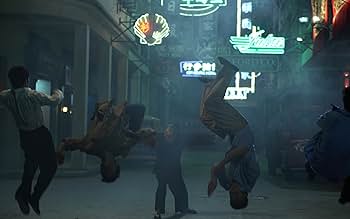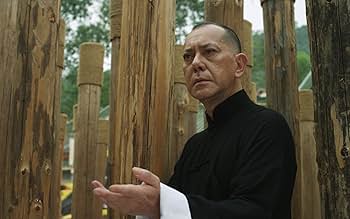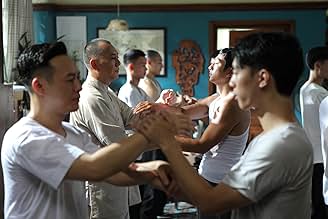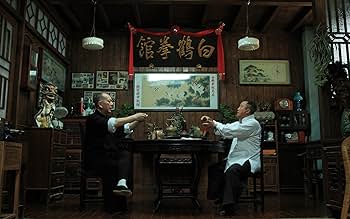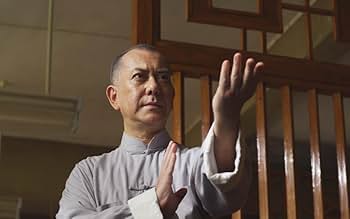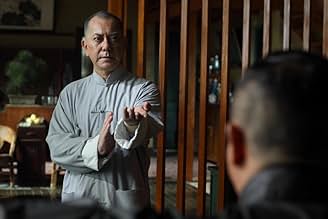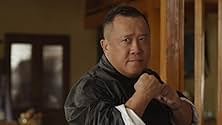AVALIAÇÃO DA IMDb
6,1/10
12 mil
SUA AVALIAÇÃO
Após a guerra em Hong Kong, um simples desafio de estilos de kung fu leva o lendário mestre Wing Chun Ip Man para um submundo escuro e perigoso. Para defender a vida e a honra, sua única esc... Ler tudoApós a guerra em Hong Kong, um simples desafio de estilos de kung fu leva o lendário mestre Wing Chun Ip Man para um submundo escuro e perigoso. Para defender a vida e a honra, sua única escolha é lutar novamente.Após a guerra em Hong Kong, um simples desafio de estilos de kung fu leva o lendário mestre Wing Chun Ip Man para um submundo escuro e perigoso. Para defender a vida e a honra, sua única escolha é lutar novamente.
- Prêmios
- 4 vitórias e 7 indicações no total
Chuchu Zhou
- Jenny
- (as Zhou Chuchu)
Xiong Xinxin
- Local Dragon
- (as Xin Xin Xiong)
Jonathan Chee Hynn Wong
- Ngai Tong
- (as Jonathan Wong)
Avaliações em destaque
Good that National Arts Films Production beat Ip Man 3 to the punch on the final chapter of Ip Man's saga. When Donnie Yen announced that he would not do another sequel to Ip Man, I thought what a pity. But now when I see Anthony Wong playing the Ip Man's part, maybe someone like him is a better cast for telling the twilight years of Ip Man's story.
The movie isn't going to be spectacular as Ip Man or Ip Man 2. You already know it from the cast. But it was good in its own ways because Anthony Wong's portrayal of the master was kind of spot on. Life in Hong Kong wasn't so easy in the '50s or '60s, and being an old man in that environment would have been hard even for a grand master of his caliber. The story integrates both Ip Man and Hong Kong pretty well. If there's a problem with this movie, story didn't flow as smoothly as it could have been, but finding story in Ip Man's old age probably wasn't so easy.
I would accept this movie as Ip Man 3. I don't know how good the real Ip Man 3 is going to be, but without Donnie Yen in the starring role, I'm sure it wouldn't have the high tension previous two movies had. As many have commented, this rush to capitalize on the Ip Man's popularity is getting to be passé. This movie was acceptable as the swan song to the saga of Ip Man.
The movie isn't going to be spectacular as Ip Man or Ip Man 2. You already know it from the cast. But it was good in its own ways because Anthony Wong's portrayal of the master was kind of spot on. Life in Hong Kong wasn't so easy in the '50s or '60s, and being an old man in that environment would have been hard even for a grand master of his caliber. The story integrates both Ip Man and Hong Kong pretty well. If there's a problem with this movie, story didn't flow as smoothly as it could have been, but finding story in Ip Man's old age probably wasn't so easy.
I would accept this movie as Ip Man 3. I don't know how good the real Ip Man 3 is going to be, but without Donnie Yen in the starring role, I'm sure it wouldn't have the high tension previous two movies had. As many have commented, this rush to capitalize on the Ip Man's popularity is getting to be passé. This movie was acceptable as the swan song to the saga of Ip Man.
Is it too soon for yet another story based on the life of the legendary Wing Chun grandmaster? Well, seeing as how utterly disappointing Wong Kar Wai's version was, the answer is an empathetic yes. Here to revive hope that there is still much we have yet to see about Ip Man's life is Herman Yau's 'Ip Man: The Final Fight', a sequel of sorts to his much flashier predecessor 'Ip Man: The Legend is Born' that focuses on the character's middle to later years.
Like Donnie Yen's 'Ip Man 2', this one begins in 1949 as Ip Man (Anthony Wong) arrives in Hong Kong from Foshan to settle into a humble room on the roof of a three-storey shophouse. Thanks to a chance encounter with martial arts enthusiast Leung Sheung (Timmy Hung, better known as son of Sammo Hung), Ip gains a small following of working-class individuals to start a makeshift Wing Chun school without needing to go against his nature to advertise his craft.
It might seem like a motley crew – including a policeman (Jordan Chan), a seamstress and union activist (Jiang Luxia), a waitress at a dim-sum restaurant (Gillian Chung), a prison officer (Marvel Chow) and a tram driver – but there's no denying their passion to learn, and at least at the start, how close-knit a group they make. Yet the circumstances then don't make it any easier for Ip nor for his students, and it is from casting the fates of Ip and his disciples against a constantly evolving but always tumultuous Hong Kong in the 1950s to 1970s that Yau's film truly comes alive.
Similarities to Alex Law's 'Echoes of the Rainbow' are not unjustified, since Yau clearly evokes the same sense of nostalgia for the period during which the former was also set. Expertly weaving several disparate themes, screenwriter Erica Li deftly paints a vivid picture of a colony rocked by tensions between the unions and their companies, infighting between the various martial arts schools, corruption of the local police and most importantly, the struggle of ordinary folk to make ends meet and provide for their family.
Li draws on these real-life historical contexts to delineate the fates of Ip and his disciples, in particular that of Tang Sing (Chan) and Wong Tung (Chow). Among the disciples, Tang Sing's character is the most fully-fleshed, depicted as a good man caught in a moral crisis between following his conscience (as Ip advises) and the temptations of power and money in his position of authority. Tang's choice to side with the infamous kingpin named Dragon (Xiong Xin Xin) behind many of the illegal activities taking place inside the notorious Kowloon Walled City inevitably entwines Wong Tung, and by extension the entire Ip Man clan that culminates in the titular showdown.
That finale is but one of four thrilling action setpieces, and easily the most gripping and exhilarating one. First within the confines of an illegal boxing ring in a warehouse and then along the exterior windswept alley battered by the onslaught of an imminent typhoon, action choreographers Li Chung Chi and Checkley Sin let the climactic fight between Ip Man and Dragon play out – the joy here not solely being from seeing veteran martial arts actor Xiong Xin Xin show off his impressive moves, but also from how Anthony Wong's one-year training in Wing Chun has truly paid off. Of course, that is also apparent from the earlier sequences, in particular one in which Ip Man squares off in a friendly closed-door bout with rival 'White Crane' master Ng Chun (comedian Eric Tsang in a fantastic cameo that shows off his agility quite certainly honed from his former days as a stuntman).
Besides demonstrating a facet of Anthony Wong's acting repertoire that is rarely seen (fun fact – the man is a dedicated practitioner of the 'Monkey Fist' style), this portrayal of Ip Man also benefits from the dramatic skills of arguably one of the best actors in Hong Kong cinema today. While Tony Leung's was just like any other of his from other Wong Kar Wai collaborations and Donnie Yen's was probably more stagey than who Ip Man was in real life, Wong's depiction is – we dare say – the most nuanced that captures both the man's humble dispositions and his internal struggles.
The latter is also thanks to a multi-layered script that doesn't just dwell on the aspects of Ip Man's life that pertain to his martial artistry, but also his personal life in relation to his wife Yong Cheng (Anita Yuen) and his son (Mainland actor Zhang Song Wen). The first Ip Man film so far to pay due attention to what must have been one of his greatest regrets spending the large part of his postwar years apart from wife and son, it just as poignantly reveals his gentle affection for a Shanghainese songstress Jenny (Zhou Chuchu) - despite the veiled objections of his students - that again finds closure in death. Wong is absolutely brilliant in these intimate moments of Ip Man's life, and it's hard to imagine a more befitting actor here to play the role.
In choosing to illuminate the less ostentatious but more relatable characteristics of Ip Man's twilight years, Yau's film truly stands apart from the other four films that have come before it. Less concerned about the legend than the Man behind it, 'Ip Man: The Final Fight' is the most heartfelt one yet about him, with an assured and sensitive directorial hand from Yau guiding a well-written script and a terrific lead performance by Anthony Wong as well as fine supporting acts from Jordan Chan, Eric Tsang and Chuchu. Even though it doesn't have Donnie Yen's star power or the marquee names of Wong Kar Wai and Tony Leung, this is a beautiful film that offers a well-balanced perspective of Ip Man's later years against the rich backdrop of post-World War II Hong Kong
Like Donnie Yen's 'Ip Man 2', this one begins in 1949 as Ip Man (Anthony Wong) arrives in Hong Kong from Foshan to settle into a humble room on the roof of a three-storey shophouse. Thanks to a chance encounter with martial arts enthusiast Leung Sheung (Timmy Hung, better known as son of Sammo Hung), Ip gains a small following of working-class individuals to start a makeshift Wing Chun school without needing to go against his nature to advertise his craft.
It might seem like a motley crew – including a policeman (Jordan Chan), a seamstress and union activist (Jiang Luxia), a waitress at a dim-sum restaurant (Gillian Chung), a prison officer (Marvel Chow) and a tram driver – but there's no denying their passion to learn, and at least at the start, how close-knit a group they make. Yet the circumstances then don't make it any easier for Ip nor for his students, and it is from casting the fates of Ip and his disciples against a constantly evolving but always tumultuous Hong Kong in the 1950s to 1970s that Yau's film truly comes alive.
Similarities to Alex Law's 'Echoes of the Rainbow' are not unjustified, since Yau clearly evokes the same sense of nostalgia for the period during which the former was also set. Expertly weaving several disparate themes, screenwriter Erica Li deftly paints a vivid picture of a colony rocked by tensions between the unions and their companies, infighting between the various martial arts schools, corruption of the local police and most importantly, the struggle of ordinary folk to make ends meet and provide for their family.
Li draws on these real-life historical contexts to delineate the fates of Ip and his disciples, in particular that of Tang Sing (Chan) and Wong Tung (Chow). Among the disciples, Tang Sing's character is the most fully-fleshed, depicted as a good man caught in a moral crisis between following his conscience (as Ip advises) and the temptations of power and money in his position of authority. Tang's choice to side with the infamous kingpin named Dragon (Xiong Xin Xin) behind many of the illegal activities taking place inside the notorious Kowloon Walled City inevitably entwines Wong Tung, and by extension the entire Ip Man clan that culminates in the titular showdown.
That finale is but one of four thrilling action setpieces, and easily the most gripping and exhilarating one. First within the confines of an illegal boxing ring in a warehouse and then along the exterior windswept alley battered by the onslaught of an imminent typhoon, action choreographers Li Chung Chi and Checkley Sin let the climactic fight between Ip Man and Dragon play out – the joy here not solely being from seeing veteran martial arts actor Xiong Xin Xin show off his impressive moves, but also from how Anthony Wong's one-year training in Wing Chun has truly paid off. Of course, that is also apparent from the earlier sequences, in particular one in which Ip Man squares off in a friendly closed-door bout with rival 'White Crane' master Ng Chun (comedian Eric Tsang in a fantastic cameo that shows off his agility quite certainly honed from his former days as a stuntman).
Besides demonstrating a facet of Anthony Wong's acting repertoire that is rarely seen (fun fact – the man is a dedicated practitioner of the 'Monkey Fist' style), this portrayal of Ip Man also benefits from the dramatic skills of arguably one of the best actors in Hong Kong cinema today. While Tony Leung's was just like any other of his from other Wong Kar Wai collaborations and Donnie Yen's was probably more stagey than who Ip Man was in real life, Wong's depiction is – we dare say – the most nuanced that captures both the man's humble dispositions and his internal struggles.
The latter is also thanks to a multi-layered script that doesn't just dwell on the aspects of Ip Man's life that pertain to his martial artistry, but also his personal life in relation to his wife Yong Cheng (Anita Yuen) and his son (Mainland actor Zhang Song Wen). The first Ip Man film so far to pay due attention to what must have been one of his greatest regrets spending the large part of his postwar years apart from wife and son, it just as poignantly reveals his gentle affection for a Shanghainese songstress Jenny (Zhou Chuchu) - despite the veiled objections of his students - that again finds closure in death. Wong is absolutely brilliant in these intimate moments of Ip Man's life, and it's hard to imagine a more befitting actor here to play the role.
In choosing to illuminate the less ostentatious but more relatable characteristics of Ip Man's twilight years, Yau's film truly stands apart from the other four films that have come before it. Less concerned about the legend than the Man behind it, 'Ip Man: The Final Fight' is the most heartfelt one yet about him, with an assured and sensitive directorial hand from Yau guiding a well-written script and a terrific lead performance by Anthony Wong as well as fine supporting acts from Jordan Chan, Eric Tsang and Chuchu. Even though it doesn't have Donnie Yen's star power or the marquee names of Wong Kar Wai and Tony Leung, this is a beautiful film that offers a well-balanced perspective of Ip Man's later years against the rich backdrop of post-World War II Hong Kong
I've spent the 1992 year in Beijing, People's Republic of China. While I was there to work as a foreign expert, I had the chance to work for China Films, where they were writing subtitles for Chinese movies which were exported to abroad customers. Most of the films were Kung Fu movies, and in all of them, the dialogues were so dumb it was laughable. it's not the case with this film. This a well-made movie, with nice battle scenes, but also with an interesting story about a real character. This Master of Wung Shin was the teacher of Bruce Lee. The story is going on from 1949 to the end of the 1960's. It's rather interesting. The version I've watched was in Cantonese, with subtitles, and I recommend it.
Not the worst HK movie I've ever seen, but pretty far down there. Overall, I think the movie just never figured out what it wanted to be. Does it want to be a biography of Ip Man? Does it want to be a nostalgic piece to serve as a trip down memory lane for older Hong Kong citizens? Is this a movie to profile an iconic figure or a movie to give as much air time to multiple movie stars? In its attempt to honour Ip Man, the movie creates a wooden character of him which leaves little room for character development or interesting acting from Anthony Wong. Weakness is a trait that all humans have, but the movie does its best to remove as much of this trait from its portrayal of Ip Man as possible to immortalize him as some sort of legendary figure. Even in scenes where weakness is demonstrated, so little of it is explored that the audience is left with little to empathize with.
As part of that attempt to honour him, the movie makers tried to tie in as many characters and story lines from Ip Man's real life as possible. But again, its a mess. Few of those characters are developed and we never really get a chance to care about who they are below the surface. For example, I would have loved to see more of who Eric Tsang and Jordan Chan's characters really were.
As a final disappointment, scenes near the end of the movie totally betray the tone and style of the overall movie as well.
Watchable, but unfocused, disjointed and unorganized. A reminder to me why I have slowly drifted away from Hong Kong movies...
As part of that attempt to honour him, the movie makers tried to tie in as many characters and story lines from Ip Man's real life as possible. But again, its a mess. Few of those characters are developed and we never really get a chance to care about who they are below the surface. For example, I would have loved to see more of who Eric Tsang and Jordan Chan's characters really were.
As a final disappointment, scenes near the end of the movie totally betray the tone and style of the overall movie as well.
Watchable, but unfocused, disjointed and unorganized. A reminder to me why I have slowly drifted away from Hong Kong movies...
Well it can't be said for sure, if it's the last one, but it does feel like a closure to a series that has spawned for movies altogether. While the first two remain the best (with zero being the weak link in that chain, though there are always worse movies as I like to say), this is a fine addition and nice round up.
Not only do you have two fine (mature) actors opposite/side-to-side, you also have a story that is told. A story that tries to show us, that violence is not key. Don't worry though, there is plenty of great action scenes in it. It actually heightens those scenes, when you have something solid in between them, that makes you wait for them
Not only do you have two fine (mature) actors opposite/side-to-side, you also have a story that is told. A story that tries to show us, that violence is not key. Don't worry though, there is plenty of great action scenes in it. It actually heightens those scenes, when you have something solid in between them, that makes you wait for them
Você sabia?
- CuriosidadesIp Man's son, Ip Chun, makes a short cameo in the movie. Appearing when Ip Man was telephoned about his wife died.
- Erros de gravaçãoWhen Ip Man arrives in Hong Kong in 1949, a Volkswagen Type 2 (aka Camper or Minibus) passes in front of him on the street. The first Type 2's were not produced until mid-November 1949 and the vehicle was not available for sale until 1950.
- ConexõesFollows Ip Man: Nasce uma Lenda (2010)
- Trilhas sonorasPing Shui Xiang Feng
Composed by Yao Nin
Lyrics by Yang Yan Qi
Sung by Wu Ying Yin
[OP: EMI Music Publishing Hong Kong
License courtesy of EMI Music Hong Kong, admin by Warner Music Hong Kong Ltd]
Principais escolhas
Faça login para avaliar e ver a lista de recomendações personalizadas
- How long is Ip Man: The Final Fight?Fornecido pela Alexa
Detalhes
Bilheteria
- Faturamento bruto nos EUA e Canadá
- US$ 37.884
- Fim de semana de estreia nos EUA e Canadá
- US$ 15.514
- 22 de set. de 2013
- Faturamento bruto mundial
- US$ 3.967.001
- Tempo de duração
- 1 h 40 min(100 min)
- Cor
- Mixagem de som
- Proporção
- 2.35 : 1
Contribua para esta página
Sugerir uma alteração ou adicionar conteúdo ausente




